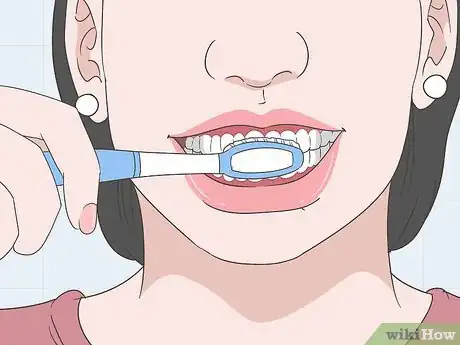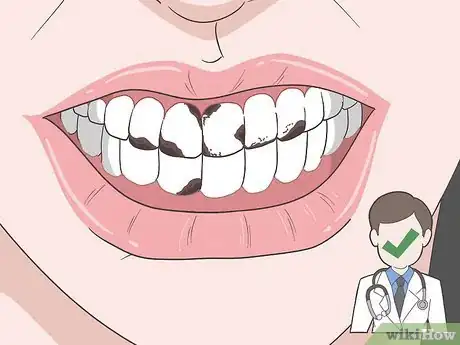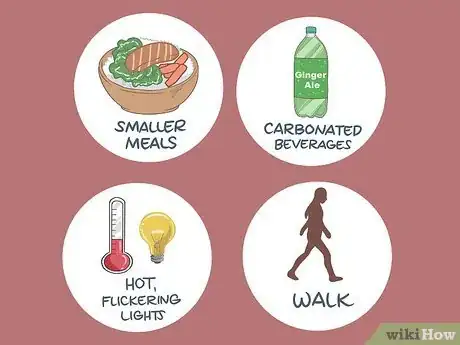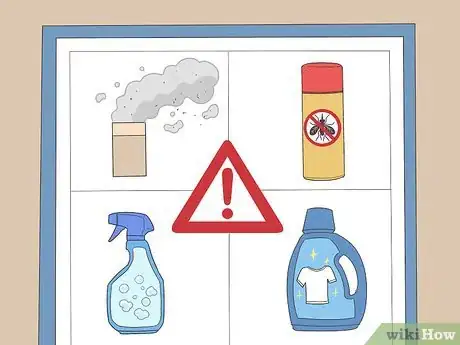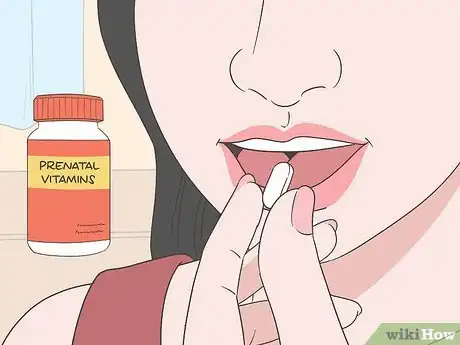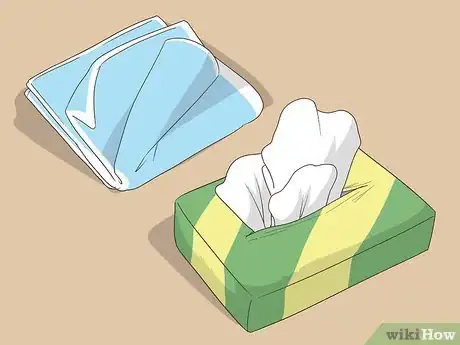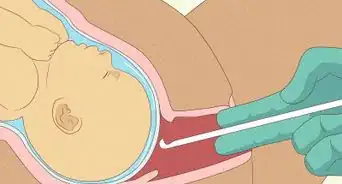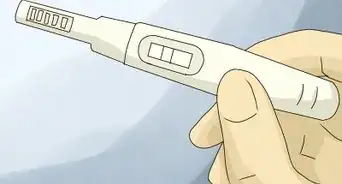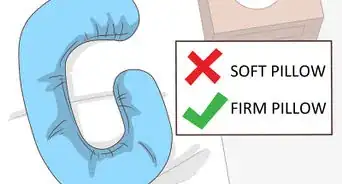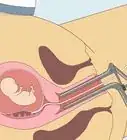This article was medically reviewed by Luba Lee, FNP-BC, MS and by wikiHow staff writer, Jennifer Mueller, JD. Luba Lee, FNP-BC is a Board-Certified Family Nurse Practitioner (FNP) and educator in Tennessee with over a decade of clinical experience. Luba has certifications in Pediatric Advanced Life Support (PALS), Emergency Medicine, Advanced Cardiac Life Support (ACLS), Team Building, and Critical Care Nursing. She received her Master of Science in Nursing (MSN) from the University of Tennessee in 2006.
There are 7 references cited in this article, which can be found at the bottom of the page.
This article has been viewed 57,936 times.
During the first trimester of pregnancy, excess saliva (technically called "ptyalism gravidarum") is common, especially if you have the nausea and vomiting (commonly called "morning sickness") that often accompany pregnancy. This condition typically clears up by the end of the first trimester, and it won’t harm your own or your baby’s health in any way.[1] However, it can be uncomfortable and embarrassing, keeping you from going about your everyday activities. Although there's no cure for this condition, apart from giving birth to your baby, there are some things you can do to help reduce the excess saliva you have and to cope with the situation while you wait for it to pass.
Steps
Caring for Your Teeth and Gums
-
1Brush your teeth immediately after eating. Keeping your teeth and gums clean and healthy can help reduce the excess saliva in your mouth. Brushing your teeth after eating can also decrease nausea and vomiting, which is what causes the excess saliva.[2]
- Using a toothpaste with a minty flavor will also help calm your stomach.
Tip: If you do happen to vomit, brush your teeth immediately afterward to get any stomach acid out of your mouth. Your body produces excess saliva to protect your teeth from stomach acid.
-
2Use a minty mouthwash. Mint can soothe your stomach and ease feelings of nausea, which can help with excess saliva. If you have excess saliva, rinse your mouth several times a day to help with bad breath and the buildup of bacteria in your mouth and on your teeth and gums.[3]
- Carry a travel-size bottle of mouthwash with you so you can rinse your mouth when you're out and about if you don't have the opportunity to brush your teeth right away.
Advertisement -
3See your dentist if you have tooth decay or an infection. Both tooth decay and oral infections can cause excess saliva. If you already have excess saliva due to pregnancy, any dental problems will only make the condition worse.[4]
- If it's been a while since your last dental checkup, go ahead and schedule one. If you do have any dental problems, your dentist can take care of them.
Easing Your Symptoms
-
1Treat your nausea and vomiting to decrease your excess saliva. Excess saliva is typically caused by morning sickness. If you have severe morning sickness, treating that might help your excess saliva as well. Some remedies for nausea and vomiting caused by pregnancy include:[5]
- Eating multiple smaller meals (say, 6 meals instead of 3) and snacking frequently
- Drinking cold, clear, and carbonated beverages, such as ginger ale or lemonade
- Avoiding triggers, such as heat and humidity, odors, or flickering light
- Going for a walk after eating
Tip: Even if you don't have nausea or vomiting, the same things that help treat those pregnancy symptoms can also be effective at treating excess saliva.
-
2Eliminate irritants that might trigger excess saliva. Smoke, pesticides, some cleaning products, and other irritants can cause a reaction that increases your saliva production. Pay attention to your physical reaction around potential irritants and avoid those that are causing excess saliva.[6]
- You might have sensitivities while pregnant that you've never had before. If something gives you a headache or makes you feel nauseous, it might also be causing excess saliva.
-
3Take your prenatal vitamin at night before you go to bed. Prenatal vitamins with iron can sometimes worsen morning sickness and excess saliva. If you normally take your prenatal vitamin in the morning, try taking it just before bed and see if that helps.[7]
- Your doctor might also suggest that you switch from a tablet to a chewable form, which is more easily absorbed.
-
4Try clinical hypnosis to treat excess saliva. Some people have found that clinical hypnosis helps relieve excess saliva as well as nausea and vomiting caused by pregnancy. While this doesn't work for everyone, it might be worth a try if other attempts have failed.[8]
- Even though hypnosis isn't harmful either to you or your baby, make sure the hypnotist you're going to is board-certified.
Dealing with Excess Saliva
-
1Try to swallow as much saliva as you can. If you have severe nausea, swallowing your saliva might make you feel worse. However, as long as you can stomach it, the easiest way to get rid of excess saliva is to keep swallowing.[9]
- If the excess saliva feels thicker, has a bitter taste, or is difficult to swallow, try drinking something, such as ginger ale, to help it go down easier.
-
2Carry tissues or a handkerchief with you at all times. There may be times when you simply can't swallow the saliva in your mouth and need to spit it out. If you have tissues or a handkerchief, you can be more discreet about this.[10]
- Dab at your mouth rather than spitting directly into the tissue or handkerchief until the problem feels like it's under control. This will keep the paper or cloth from getting too wet.
- If you have tissues, you can simply throw them away. Keep your handkerchief in a plastic bag so you don't have to worry about anything else getting wet or damaged by it.
-
3Chew sugarless gum to help soak up the excess saliva. Chewing gum won't necessarily cause your body to produce less saliva, but it will help soak up the excess saliva already in your mouth. It can also make the saliva easier to swallow.[11]
- Mint gum might also soothe your stomach. If you feel less nauseous, your body will be less likely to produce excess saliva.
Tip: Sucking on a piece of hard candy or a breath mint might also help. As with the gum, make sure it's sugarless.
-
4Sip water throughout the day. Your body will naturally produce excess saliva if you're dehydrated. By drinking water throughout the day, you can ensure that your body is well-hydrated. Sipping water also helps break up the thicker saliva and makes it easier to swallow.[12]
- Get a water bottle that you can carry with you and refill it when you have the opportunity. That will make it easy for you to make sure you're drinking enough water to stay hydrated.
Warnings
- Contact your doctor or obstetrician immediately if you have severe vomiting, abdominal or pelvic pain or cramping, fever or diarrhea in addition to nausea and vomiting, or have lost more than 5 pounds (2.3 kg).⧼thumbs_response⧽
References
- ↑ https://www.nct.org.uk/pregnancy/worries-and-discomforts/common-discomforts/excessive-saliva-pregnancy
- ↑ https://www.whattoexpect.com/pregnancy/symptoms-and-solutions/saliva.aspx
- ↑ https://www.whattoexpect.com/pregnancy/symptoms-and-solutions/saliva.aspx
- ↑ https://www.babycenter.com/0_excessive-saliva-during-pregnancy_9454.bc
- ↑ http://www.natboard.com/index_files/Page548.htm
- ↑ https://www.nct.org.uk/pregnancy/worries-and-discomforts/common-discomforts/excessive-saliva-pregnancy
- ↑ https://www.uptodate.com/contents/nausea-and-vomiting-of-pregnancy-beyond-the-basics
- ↑ https://www.researchgate.net/publication/280933306_Successful_Treatment_of_Ptyalism_Gravidarum_With_Concomitant_Hyperemesis_Using_Hypnosis
- ↑ https://www.babycenter.com/0_excessive-saliva-during-pregnancy_9454.bc
